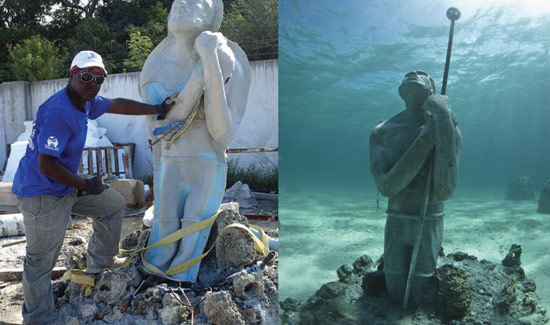 Nassau, The Bahamas – Reducing Energy Intensity throughout The Bahamas is the beginning of responsible citizen behaviour toward increasing the Bahamian contribution to mitigating the global carbon footprint. Energy statistics show that The Bahamas imported 7,814,000 barrels of oil and petroleum products in 2010, at a cost of $695,810,000, or approximately 10 percent of The Bahamas’ GDP for that year.
Nassau, The Bahamas – Reducing Energy Intensity throughout The Bahamas is the beginning of responsible citizen behaviour toward increasing the Bahamian contribution to mitigating the global carbon footprint. Energy statistics show that The Bahamas imported 7,814,000 barrels of oil and petroleum products in 2010, at a cost of $695,810,000, or approximately 10 percent of The Bahamas’ GDP for that year.
“The typical household in The Bahamas produces approximately one ton of carbon dioxide a year, through the consumption of petroleum products. Generally, the contribution to carbon dioxide from cooking gas is very small in comparison to that of electricity consumption,” said Phenton Neymour, Minister of State for the Environment, as he addressed the February 6 meeting of the Rotary Club of Nassau on the National energy Policy and the importance of putting energy efficiency measures in place to secure the reduction of the nation’s dependency on fossil fuels.
“The carbon footprint of the average tourist visiting The Bahamas is not significantly less per day than that of residents. The Energy Intensity of The Bahamas is relatively high, he told the Rotarians.”
Minister Neymour discussed the progress of Bahamian Energy Independence, which he noted is still a long way off. However, he said since adopting recommendations of the First Report, several goals have been achieved including providing tax incentives to promote the use of energy efficient lighting, offering incentives for more fuel-efficient vehicles and encouraging the use of solar hot water systems.
“I am pleased to report to you that the process has started. Energy Independence has to be a shared responsibility. The Government of The Bahamas through its policies and initiatives must provide guidance for the citizenry,” he said.
“In 2008, the National Energy Policy Committee developed their first report which identified several urgent actions needed to transform the energy sector to one that uses renewable energies and energy-efficient technologies and addresses energy efficiency, energy conservation, energy management, renewable energy and other issues,” said Minister Neymour.
He added that another positive outcome of the energy policy is the formulation of an energy action plan to bring about rapid achievement of the remaining goals, including a revision of Customs Import Duty Regulations, in order to encourage the importation of energy efficient technology. The efficiency program me included energy efficiency surveys and audits for public buildings, residential and commercial sectors to assess energy uses and electricity consumption patterns to implement energy efficiency technologies and strategies.
“$0.9 million to develop an energy efficiency programme for The Bahamas, and determine the potential for renewable energy including an island by island assessment of solar, wind, bio-energy and ocean energy, in addition to a feasibility study on waste to energy potential for New Providence, and Grand Bahama”, said Minister Neymour.
“$0.6 million to promote the use of energy efficient residential lighting through the procurement and distribution of 270,000 compact fluorescent light bulbs (CFL) to replace working incandescent light bulbs. $1.3 million was invested to implement sustainable energy through the design and execution of pilot projects. The projects include procurement and distribution of over 130 solar water heaters, and 33 solar energy systems at no capital cost to the homeowners. This will bring significant energy saving to the participants and provide data to assist in expanding the energy sector.”
Minister Neymour stated that small island states such as the Bahamas and Caribbean nations, with the possible exception of Trinidad and Tobago, are particularly susceptible to the rising cost of fossil fuels, and the tremendous impact that the use of fossil fuels can bring to our economies.
“It cannot be argued that there is an indissoluble coupling of energy and development. The International Energy Agency has developed an Energy Development Index (EDI) in order to better understand the role that energy plays in human development,” said Minister Neymour.
“Their data suggest that developing countries and many Caribbean countries are still transitioning to a more effective integration of the use of fossil fuels. If it is true that energy and development are closely coupled, then The Bahamas is placed in a precarious situation of having our national development tied to such a problematic commodity.”
Mr. Neymour explained that due to a lack of readily available local sources of energy, The Bahamas is constrained to the necessity of importing all of the energy that drives industry, and provides the convenience for all Bahamians.
“In The Bahamas all of our energy generation sources are imported and comes mainly from liquid and gaseous petroleum products such as diesel oil (Cars and Trucks and BEC), Bunker C (BEC and Freeport Power) and propane (cooking gas). The Bahamas is very similar to many countries in the region in this regard with the obvious exception of Trinidad and Tobago, which has reserves of oil,” said Minister Neymour.
“Contrast this to the United States which in 2011, consumed more than 800 million tons of coal in the production of electricity. Also in 2011 the United States produced more than 19 percent of its electrical energy requirements from 101 nuclear fired power plants. These two options are not available to The Bahamas for obvious reasons, even though they are among the least expensive sources of utility scale energy in the world.”
Minister Neymour said Solar Water Heater technology has been installed in government subdivisions and includes a metering system for monitoring and storing data on solar production, hot water consumption and other useful variables that will provide real data on domestic thermal energy consumption levels.
He also said that Solar Photovoltaic Systems are also procured and will be installed in residential homes. The systems also include a monitoring system and data storage on solar production, energy generated and fed back into the grid and other useful variables that will provide real data on domestic solar energy and consumption levels.
“$80,000 to implement a Public Awareness Campaign targeted seven islands with over 200 participants in over 10 communities. Education in the schools with 15 school visits during energy week including eight technical tours,” said Minister Neymour.
Minister Neymour outlined the Government’s assessment of its Renewable Energies Potential. It includes an assessment of the potential for Renewable Energy and determining the cost of implementation of these renewable energy technologies. As well, it developed a prioritised plan of action to include renewable energy in the energy matrix of The Bahamas and support the preparation of a Waste to Energy assessment that will identify the possible options to obtain energy from landfills and other sources of waste.
Currently, Minister Neymour said the renewable energy programme included identifying the potential for bio-energy production including Biodiesel. The Government of The Bahamas subsequently issued two licenses for the production of Biodiesel. One of the license holders, Bahamas Waste Management Ltd, has installed a $1 million plant that is capable of producing in excess of 1 million gallons of biodiesel annually.
“The Bahamas Electricity Corporation signed a memorandum of understanding with Ocean Thermal Energy Company that will lead to the production of electricity on a utility scale from sea water temperature differences,” said Minister Neymour.
“The Water and Sewerage Corporation signed an agreement for the production of electricity from wind. Studies to ascertain the wind profiles that exist on the island of Eleuthera have recently commenced.”
Minister Neymour advised Rotarians that as consumers they should become more efficient as an everyday practice to save money and energy. He suggested to monitor home energy use, air leaks and insulation that protect against thermal energy build up, use efficient systems to heat and cool your home, install a timer on water heaters, install energy efficient windows in your home, use CFLs and LEDs as lighting alternatives, use energy efficient appliances, reduce the output of home office electronics by choosing efficient ones, and choose efficient transportation options. These best practices are expected to reduce the Bahamian carbon footprint and eventually the national dependence on fossil fuels.
By Gena Gibbs
BAHAMAS INFORMATION SERVICES



